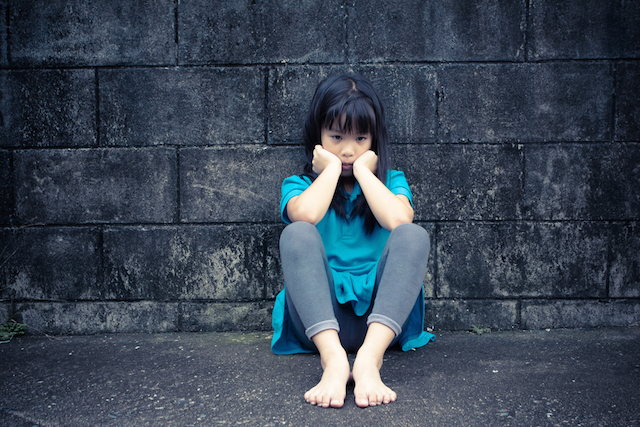
“It is never to late to have a happy childhood.” ~Tom Robbins
A few days ago, when my older brother and I were sorting through old family photos, we found a picture of us from when we were about five and six years old. We were smiling. Just two kids full of life with no idea of what was to come.
This was before the start of all the rage—before all the pain and an unfortunate series of events.
My childhood was rough. I know some people may wish to return to those young innocent years of playing outside and going about our way without a worry in the world. However, if I had a choice to return to my childhood, I would hesitate at the gate.
At the tender age of eleven, I was snatched from my home. I didn’t know why, all I knew was that my mother had done something bad and that my siblings and I had to be removed for our safety.
When I was old enough to understand what had happened, I learned that my mother had gone to a mental institution to receive help and counseling for her anger.
I used to think, “Well, everyone gets angry,” but this was different.
Her words were a bit too harsh, her actions a bit too unpredictable, her impact a bit too negative. I remember sitting in the bathroom crying and wondering why I just couldn’t live a simple, happy life like the children in movies.
Recovering from a traumatic childhood can be extremely difficult, especially when taking into consideration how valuable our childhoods are when preparing for adulthood. As of today, although my mother is generally in a more stable mindset, I can still hear the sound of her voice shouting threats I wouldn’t wish on my worst enemy.
When attempting to deal with a traumatic childhood, I feel the first solution that comes to mind is to forget it. However, trying to pretend that something did not happen doesn’t fix the negativity it has already enforced.
When I first entered college, I saw it as an opportunity to get away from home and interact with others. With this in mind, I left my family home, but brought all the effects of my childhood with me.
Throughout my high school years, I had become agoraphobic. I barely left my house and it pained me to attend school. When I entered college the same pattern persisted.
I was scarred and I blamed my mother.
She was the reason I was so negative, vain, and alone. I finally came to the conclusion that I no longer wanted to dwell on the past, allowing it to devour me inside out. So I eventually had to learn to let go, which proved more difficult than I first perceived.
The first step to recovering from a childhood of physical, emotional, or mental abuse would be to attack it at the source. I mean standing head to head with what happened and not running away. We must accept that it happened and admit that it has affected us.
When I attempted to dispose of my issue by running off to college, I forgot that it was still the reason behind my negative attitude. I would try so hard to disguise the fact that something was wrong and that I was unhappy.
I thought it made me look weak and defeated. However, accepting that something is wrong takes even more strength than trying to pretend that everything is all right.
It also allows you to take control of your life and put yourself on the path to healing.
After determining that I was indeed affected by my mother’s explosive fits of rage, which led to other events throughout my childhood, I needed clarification as to why all of these things had occurred.
I wanted to get to the bottom and dig up the roots of this issue in order to seek closure. So I sat and spoke with my mother, something I had never done. She explained to me that anger disorders had always been prominent in her family.
She informed me of the time my grandmother killed a puppy trapped under her barn because the noise kept her up at night.
She also told me how my grandfather went into explosive fits of rage after coming home from a night of drinking. At one point he even attempted to hit her with an axe. I then realized that my mother’s behavior did not come from her genuinely despising me, but was a direct reflection of what she’d experienced during her childhood.
With this, I knew that I had to change because I did not want to continue to spread this lineage of anger.
When we ask questions and gain clarification, we begin to achieve a sense of peace or relief that we finally have the answers and can learn to move on. When we choose to run away from our problems, we never get the clarification we need to move forward.
Another important step on the journey to recovery is learning to define our happiness by ourselves. Quite often, we tend to dwell on the challenges of our childhood and blame them on one particular person, or blame them for our current unhappiness.
Not to say that our traumatic childhoods had no effect of our adult lives, but rather the reason we are still unhappy is because we’ve chosen not to recognize these effects and properly address them so that we may move forward.
If you choose to remain in a state of unhappiness due to the challenges faced during childhood, you will never be able to find peace.
During my high school years, I would always blame my mother for my childhood experiences, and I concluded that my childhood experiences were the reason I could not be successful or accomplish the things I wanted to accomplish.
I felt my childhood had made me a victim, and thought that was the reason behind my unhappiness and overall instability.
What I came to understand was that I was still unhappy because of the fact that I viewed myself as a victim. I was still unhappy because I held on to my childhood. To me, it was a valid explanation for all the things I felt I could not do.
I became a happier person when I began taking responsibility for my own happiness. I stopped blaming my mother for every horrible thing that had ever happened to me and I stopped blaming my childhood for my failure.
One of the most common mistakes we make when referencing our traumatic childhoods is comparing them to others with “normal” childhood experiences. When we compare ourselves, we are taking away from the essence of who we are. Our childhoods, traumatic or not, are a part of who we are and what makes us, us.
Take a look around and think of where you are now. You may have a beautiful family and the career you’ve always wanted. As for me, had I not had such a traumatic childhood I wouldn’t be able to write this post and help someone else by sharing my story.
Think of all the good things that have come from your experience and you might just begin to be thankful you had it.
One of the major lessons I’ve learned throughout my entire journey is that sometimes you just have to let go and trust that everything will turn out okay. Moving on from the past is stressful, especially when we feel as if we have an obligation to fix something that can no longer be fixed.
We also tend to look to the past for answers to current situations. By doing this we are unintentionally taking away from present moment. Holding on to my traumatic childhood prevented me from moving forward with the rest of my life.
It wasn’t my childhood preventing me from accomplishing things; it was my negative perception of myself. When I finally decided enough was enough, I began to look at things from a different angle.
Maybe it wasn’t my fault or anyone’s fault for that matter—it doesn’t matter. What does matter is finding happiness once again and being content with what happened in my past without allowing it to become a burden.
We sometimes get this clouded illusion of how life is supposed to be, but truth be told, you have to fight through some bad days, to earn the best days of your life.
Sad child image via Shutterstock
About Jacquette Chamblee
Jaquetta Chamblee is a student, blogger and lover of all things beauty, art and writing related. Her blog anoptimistspen.blogspot.com is a literary lifestyle blog dedicated to personal well-ness and self-improvement with a focus on positivity,inspiration,balance and happiness. You may often find Jaquetta settling a dispute, drinking herbal tea, quoting Shakespeare, or making someone smile.













 Though I run this site, it is not mine. It's ours. It's not about me. It's about us. Your stories and your wisdom are just as meaningful as mine.
Though I run this site, it is not mine. It's ours. It's not about me. It's about us. Your stories and your wisdom are just as meaningful as mine.
One’s self-perception, unfortunately, is also a product of one’s parenting. The brain is changed, often signigficantly, from trauma, and developmental stages are interrupted. Also, the unconscious mind does not reveal itself easily or quickly. I also think that it’s necessary to see oneself as a victim–a step that is often skipped because it requires a shedding of denial about one’s parents (and because, at least in U.S. culture, it’s considered a “flaw”). Only after you understand that you are a victim and without blame can you proceed to make healthier choices for yourself, as the author says.
Very well stated, thank you for your insight and thoughtfulness.
It’s one thing to realize you lived through some s***t outside your control that impacted you. Issue is victim mentality is a loss of emotional control over your environment and your self.
Thank you for this, this was exactly what I needed to hear 🙂
You are most certainly welcome, I am so glad you enjoyed reading!
Jacquette:
Great job articulating the lonesome confusion, constant anger, and other consequences correlated to traumatic childhoods. Also, thank you for sharing your insightful wisdom on healing and letting go of detrimental choices as an adult.
I also grew up in a home with a mentally ill mother. My father was not much better, and by the age of 11 I was living in different foster homes and on the streets. By 15, I had moved in with the man who later fathered my child, and that trajectory was a reiteration of my past all over again as my life became as series of extensive broken relationships. Long story short, I played the role of “damaged victim” for nearly 30 more years before I was ready to let go of my effed up childhood.
Wise words like yours might have changed my life if I had realized I was not alone with such powerful shame and fear and rage (not counting everyone else sitting at the bar…). In the end, it turns out that it is never to late to have a happy childhood if that is the path you choose.
I am grateful for social media technologies that allow folks like you to truly impact other peoples lives with positive energy and hope. Thank you!
No, thank you for sharing your story with me! It is extremely inspiring to be able to listen to the stories of others who have experienced similar circumstances. To be honest, reading the stories and experienced of others is how I obtained the courage to share my own story. Social media has indeed created a way for people to connect and share all sorts of experiences and stories and had I not stumbled upon the blogging world myself I would have never been given the opportunity to read such inspiring and insightful stories like yours. It’s great to have people who inspire you and can relate to what you have endured. Thank you so much for your insight and powerful encouraging words. May your story inspire others to live the childhood they’ve always dreamed of. I wish you well in your future endeavors.
best wishes
-Jaquetta Chamblee
Awwww! Thank you again. I look forward to more of your good writing! 🙂
I love this post thank you! 😊
Thank you for your time, I’m glad you loved it!
Thank you for being so brave and sharing your experience and what you’ve learned through your journey. I have many experiences and memories from my childhood involving anger and alcohol and still haven’t been able to share with anyone because I am still trying to work through it. Reading how you’ve become stronger through it all really helps and comforting to know that it is a healing process that just takes time and work. Yoga has had the biggest impact in my life allowing me to learn to love myself and share love with others. I can tell you truly are a beautiful soul and wish you the best on your journey, again thank you for sharing your strength 🙂
Thank you so much, I’m so glad I was able to inspire you. It is such an honor to be able to move others with my experiences which proves that something good always comes from our struggles. I’ve always believed that loving yourself and finding happiness involves spreading love and happiness to others. I wish you nothing but the best on your journey and I hope that you find the courage to share your story one day because I would love to read it. We all go through unfortunate events and feel as if nothing can get better but these hard times are what makes us stronger and I want to thank you for taking the time out of your day to make my journey just a bit easier by reading my story and letting me know that I am not alone. 🙂
Thanks, you have put in words what i’ve lived (we had almost the same problems) and still will. You are ahead of me, but with your post I know what to do now 🙂
I learned long ago that I was the common denominator in every situation. I am always there when good or bad happens. Therefore I need to change me not the situations. This concept literally changed my life. It started me down the road to dealing with my traumatic past. Thank you for this. Great reading🙏🏾
and how did you do this? how did you change yourself?
through meditation and spending lots of time alone.
that’s awesome. i wish i was content being alone.
It took me awhile do not worry when the time is right you will
thanks 🙂 i don’t have anything else to do but wait lol
i’ve been in recovery (12 step) for 7 years..I’m better than i used to be i guess lol
🙂
I agree that blaming keeps you from moving forward.
Positive affirmations in self-perception and perception of the world needs to be a daily practice for my life. The tendency to cling to what is familiar to us even if it is to our own detriment is powerful and can overtake us if we are not aware. The daily practice of mindfulness meditation can stave off old destructive tendencies and give insight to your authentic self. One of interconnected consciousness which is whole, perfect, spacious, and infinite just the way we are in this present moment. Thank you for sharing your story!
Part of my problem is I’m still kinda stuck on my “traumatic situation” I get stuck for sure at times. Like in a way I ended up back at the next I later realised precicley because of these issues.